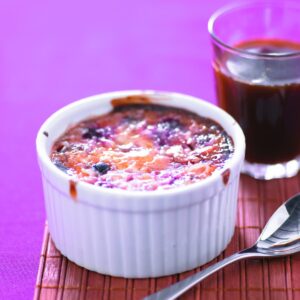
New research shows your gut plays an even bigger role in brain health than first thought. Health writer Karen Fittall shows why your gut — and what you eat — is so important.
When you think ‘brain food’, you probably think oily fish, antioxidant-rich berries and even dark chocolate. And you’re not wrong. Research has linked all of these foods, or at least specific nutrients within them, to better brain health in some shape or form.
But it turns out there’s another way that you can eat to benefit your brain — and that’s by putting plenty of gut-health-friendly foods on your plate
How your gut affects your mood
The link between the gut and brain health isn’t new. Previous research has shown gut health affects mood, and that there’s a link between specific gut bacteria and a lower risk of anxiety, stress-related symptoms and depression.
One reason is that the gut, which is home to hundreds of millions of neurons and about 25 neurotransmitters, sends messages to the brain.
Until now, most of the focus on the gut-health/brain-health connection has centred on the 1.5kg of bacteria that live in your gut — and for good reason. As well as being able to send messages to the brain all on their own, bacteria also play a role in the production of your gut’s ‘neurotransmitters’ to the brain.
However, new research by Melbourne’s RMIT University has revealed there’s a brand new connection between your digestive system and your brain’s health. It’s called gut mucus, and looking after it might help protect you against some serious, yet common, neurodegenerative diseases.
Why gut mucus matters
Gut or intestinal mucus is mucus that lines the digestive tract, acting as a physical barrier to contain the gut’s bacteria.
“Mucus is a critical protective layer that helps balance good and bad bacteria in your gut,” says senior author of the new gut-brain study, Associate Professor Elisa Hill-Yardin from RMIT University.
Her research found that, as well as being the body’s first line of defence against ‘bad’ gut bacteria, the mucus might also play a role in protecting against diseases of the brain.
The gut-brain connection
What is the connection between gut mucus, brain health and brain-related disease? Research shows that when your gut mucus isn’t in tip-top shape, which can result from not eating enough fibre, it contributes to something called ‘leaky gut’.
This is where bacteria — and other things — are able to penetrate the gut’s lining. This can cause systemic inflammation, where the body’s immune system stays permanently on alert, which contributes to the development of disease, including neurodegenerative disorders.
In fact, research has implicated leaky gut directly in diseases such as Alzheimer’s, Parkinson’s and multiple sclerosis. One explanation is that the inflammation that leaky gut encourages damages the blood/brain barrier — the brain’s defence against disease-causing bugs and toxins that might be circulating in the blood.
Associate Professor Hill-Yardin says the RMIT-based research, as well as focusing attention on reducing the risk of these brain diseases, also shines new light on something else.
“It’s a new gut-brain connection that opens up fresh avenues for scientists to explore, as we search for ways to better treat disorders of the brain, by targeting our ‘second brain’ — the gut.”
Feed your gut and protect your brain
With your gut’s bacteria — and its mucus lining — both playing a key role in brain health, it pays to do what you can to look after them. Luckily, that can be as simple as putting specific foods on your plate — and it turns out both gut bacteria and mucus have similar food ‘tastes’.
Bacteria and mucus work closely together. In fact, bacteria can make or break just how healthy your gut mucus is; likewise, gut mucus kills certain types of bacteria, while acting as a valuable food source for other varieties.
Five healthy ways to feed your gut…
1 Eat plenty of prebiotics
Prebiotics stimulate the growth and activity of good bacteria, including those that help ‘build’ gut mucus while inhibiting the growth of bacteria that counter gut mucus.
What is a prebiotic? Basically, it’s just a type of fibre — but not all fibre is prebiotic. Prebiotic fibres can pass through the small intestine unscathed, so they then serve as food for the good bacteria living in your large intestine.
Luckily a variety of foods from the major food groups contain prebiotic fibres, so it’s not difficult to bump up your intake.
- Sources include:
Vegetables such as asparagus, fennel, green peas, sweetcorn, snow peas and anything from the onion family - Fruit such as watermelon, grapefruit, nectarines and white peaches, as well as dried fruit such as date
- Legumes such as lentils, kidney beans, chickpeas, baked beans and edamame
- Cereals such as oats, couscous, barley, rye bread and pasta
- Nuts and seeds such as cashews and pistachio nuts
2 Strive for ‘two and five’
Eating two serves of fruit and at least five serves of veggies every day is recommended for general good health — but it’s also a very smart thing to do for your gut health.
Fruit and veg are rich sources of polyphenols. These compounds exert a positive impact on gut bacteria, including encouraging the growth of a specific bacteria stain that help support strong, healthy gut mucus.
Only one in 20 Australian adults hits the recommended fruit and vegetable target every day, so if you’re not among them, it’s time to turn that around.
HFG tip
‘Eat the rainbow’ to get the most benefits out of food for your gut and brain
3 Put some fermented foods on your plate
This means consuming foods like kimchi and sauerkraut. These will deliver a hit of probiotics, which are live bacteria that add to and mingle with the population of bacteria already living in your gut.
Probiotics help to restore the gut’s ‘good’ versus ‘bad’ bacterial balance. Specific probiotic strains, including ones from the lactobacillus family, also help bacteria bind to gut mucus, which is an important aspect of gut health.
4 Limit saturated fat
Diets high in saturated fat promote the growth of harmful species of gut bacteria, and reduce the diversity of the strains that live in the gut too.
And you don’t want that: research also shows people who have a larger variety of bacteria living in their digestive systems have a lower risk of a range of health problems.
Plus, eating too much fat may also reduce the abundance of that same type of gut-mucus-promoting bacteria that all that fruit and veg you’re eating helps to flourish.
HFG tip
Choose leaner cuts of meat and reduced-fat dairy foods. And if you buy any processed or packaged foods, try to pick products that contain less than 3g of saturated fat per 100g.
5 Go slow on drinking alcohol
The impact alcohol has on gut health isn’t 100 per cent clearcut just yet. Some research shows that certain types of alcohol — like red wine — may actually improve the diversity of gut bacteria.
However other studies show alcohol inhibits the growth of gut-mucus-friendly types of bacteria. The general consensus is there isn’t a definite answer one way or the other.
So if you do drink alcohol, enjoy it in moderation. Don’t have any more than 10 standard drinks per week, and no more than four standard drinks on any single day.
Benefits beyond the brain
Your grey matter isn’t the only thing that will benefit when you eat in a gut-health-friendly way.
Boosting the quality of both the bacteria and the mucus that live in your gut delivers brain and mental health benefits — but other perks are equally enticing.
These include a lower risk of heart disease and of diabetes, a better night’s sleep, and a healthier, more robust immune system. You might even find it easier to lose weight, too!
People with autism, Parkinson’s disease, Alzheimer’s and multiple sclerosis have different types of bacteria in their gut mucus compared with other people, and different amounts of both good and bad bacteria.
Article sources and references
- Amen DG et al. 2017. Quantitative erythrocyte omega-3 EPA plus DHA levels are related to higher regional cerebral blood flow on brain SPECT. J Alzheimer’s Dis. 58(4):1189-1199.https://pubmed.ncbi.nlm.nih.gov/28527220/
- CHOICE. 2016. Fermented foods. Accessed June 2020https://www.choice.com.au/food-and-drink/nutrition/superfoods/articles/fermented-foods
- Furness JB et al. 2014. The enteric nervous system and gastrointestinal innervation: integrated local and central control. Adv Exp Med Biol. 817–39.https://pubmed.ncbi.nlm.nih.gov/24997029/
- Harvard Medical School. The Gut and the Brain. Accessed July 2020.https://neuro.hms.harvard.edu/harvard-mahoney-neuroscience-institute/brain-newsletter/and-brain/gut-and-brain
- ohn Hopkins Medicine. The Brain-Gut Connection. Accessed July 2020.https://www.hopkinsmedicine.org/health/wellness-and-prevention/the-brain-gut-connection
- Medical Daily. 2013. Mood-altering yogurt? Probiotics change brain function with gut bacteria. Accessed July 2020.https://www.medicaldaily.com/mood-altering-yogurt-probiotics-change-brain-function-gut-bacteria-246300
- NHS. Mucus in the gut may help relieve bowl inflammation. Accessed July 2020.https://www.nhs.uk/news/food-and-diet/mucus-in-the-gut-may-help-relieve-bowel-inflammation/
- Pierce JM et al. 2019. The role of inflammation and the gut microbiome in depression and anxiety.https://onlinelibrary.wiley.com/doi/full/10.1002/jnr.24476
- RMIT University. 2020. New gut-brain link: how gut mucus could help treat brain disorders. Accessed July 2020.https://www.rmit.edu.au/news/media-releases-and-expert-comments/2020/may/gut-brain-mucus
- Subash S et al. 2014. Neuroprotective effects of berry fruits on neurodegenerative diseases. Neural regen Res. 9(16): 1557–1556.https://www.ncbi.nlm.nih.gov/pmc/articles/PMC4192974/
- University of Copenhagen. 2013. One in four has alarmingly few intestinal bacteria. Accessed July 2020.https://news.ku.dk/all_news/2013/2013.8/one_in_four_has_alarmingly_few_intestinal_bacteria/
www.healthyfood.com










